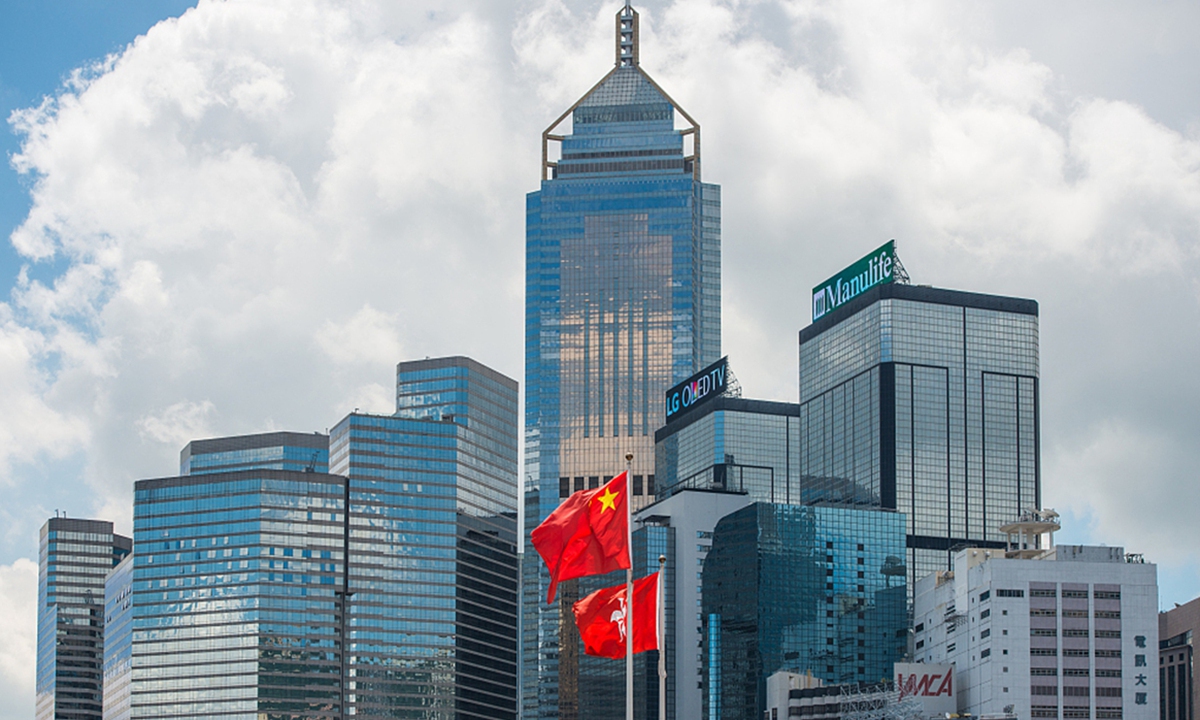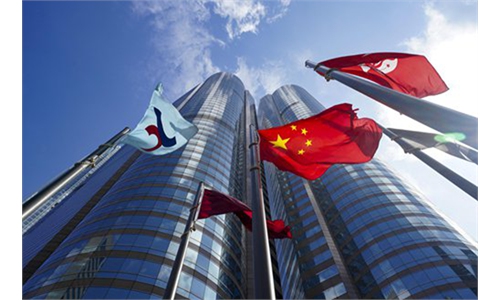
Hong Kong File Photo: VCG
From the collapse of Silicon Valley Bank to the crisis at Credit Suisse, the international financial market is experiencing a wave of shocks. Facing the current turbulent external market environment, Hong Kong's financial industry has displayed its own unique advantages.
The current global political and economic landscape is far different from that of the 2008 financial crisis. Squeezed by persistently high inflation, a growing debt burden, ongoing geopolitical conflicts, and industrial supply chain disruptions, there is little room left for the US and Europe to achieve macroeconomic stabilization any time soon.
It is becoming more and more difficult to simultaneously achieve multiple policy objectives such as curbing inflation, maintaining financial stability and avoiding economic recession.
If the ongoing turmoil among US and European banks further spreads, the risk of economic recession will rise sharply, and the investment and financing activity in the global capital market may drop significantly. The banking industry also needs to enter a period of adjustment and recovery and significant replenishment of capital.
The current round of US and European banking turmoil has limited direct impact on Hong Kong's financial industry. The Chief Executive of the Hong Kong Special Administrative Region (HKSAR) John Lee Ka-chiu, said recently that troubled Credit Suisse's business in Hong Kong is relatively small, and its business is currently operating normally. Julia Leung Fung-yee, CEO of Hong Kong's Securities and Futures Commission, also pointed out that the Credit Suisse predicament has little impact on Hong Kong's financial market.
Unlike the US and Europe, as an international financial hub, Hong Kong has the unique advantage of "One country, Two systems" in maintaining its financial stability and promoting financial development.
China is currently promoting high-level opening-up, and accelerating the establishment of a new development pattern with main focus placed on domestic consumption and featuring positive interplay between domestic circulation and international engagement. Hong Kong has a unique strategic position and role in this new development pattern. It is a window and bridge connecting the internal and external circulation.
Over recent years, the Chinese mainland has strengthened and improved financial supervision, deepened financial system reform, and smoothly resolved the risks of high-risk small and medium-size financial institutions, protecting the bottom line of no systemic financial risks, which provide a solid foundation for Hong Kong's financial stability.
Hong Kong has a solid foreign exchange reserve basis, a mature and stable linked exchange rate system, overall sufficient liquidity in the local banking system, stable operation of financial institutions, and healthy development of offshore yuan trading market.
The optimized currency swap agreement signed by the Hong Kong Monetary Authority and the central bank is conducive to promoting the further development of the yuan "capital pool" in Hong Kong. Meanwhile, Hong Kong's financial system continues to strengthen the construction of interconnection mechanisms with the mainland, including the north-south two-way Shanghai-Hong Kong Stock Connect, Shenzhen-Hong Kong Stock Connect, Bond Connect and Cross-border Wealth Management Connect.
Hong Kong is also exploring the development of the debt instrument Central Moneymarkets Unit (CMU) into a major International Central Securities Depository (ICSD) in Asia, providing safe and efficient assets transaction channel for foreign investors through the connection between Hong Kong and mainland financial infrastructure institutions.
The latest response from the Hong Kong Monetary Authority stated that as an international financial center, Hong Kong often handles capital inflows and outflows arising from different commercial activities. The HKMA will maintain close contact with the financial industry and other stakeholders to promote the continued development of Hong Kong's financial market.
For the global financial system, the biggest challenge in the future lies in the possible resonance of financial market and geopolitical risks. At present, the trend of politicization and weaponization of international finance is becoming more and more obvious. In this context, the construction of Hong Kong as an international financial center needs to maintain sufficient sensitivity to the game of geopolitics and financial security, and comprehensively coordinate financial development and security. Hong Kong should further play the role of a super-connector of the "dual circulation" to promote interconnection with the mainland's financial market.
At the same time, Hong Kong should focus on the opportunities created by the "Belt and Road Initiative" and the construction of the Guangdong-Hong Kong-Macao Greater Bay Area, guide the financial market to better cooperate with the reorganization and development of regional industrial chains and supply chains under the trend of multi-polarization, and promote the internationalization of yuan.
In building high quality and controllable financial infrastructure that is in line with international standards, Hong Kong could play a leading role, fully promote innovation in financial technology and financial oversight, seize the opportunity of digital currency and payment technology revolution, to bolster the special administrative region's financial infrastructure.
The author is an associate professor at the Chinese University of Hong Kong and a member of Chinese Association of Hong Kong & Macao Studies. bizopinion@globaltimes.com.cn


